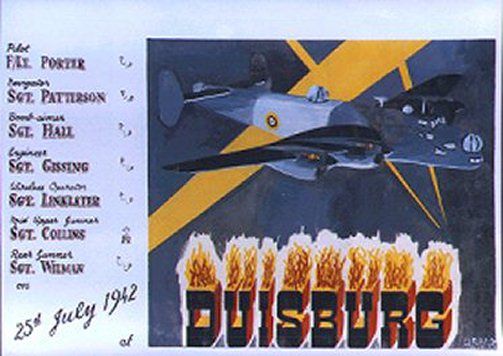 Previous Section |
 Go Back to Chapter Headings |
 Next Section |
During the winter of 1942/1943, Red Cross parcels did not come in well and
the soup was invariable turnip. So you were constantly hungry, the barracks were
very cold especially with the concrete floors, and you did not have the stamina
to walk. Chilblains were a bother, but as long as your feet were cold they did
not ache and as soon as your feet felt warm they would ache. We told one chap
that if he stood outside in the snow in his bare feet it would ease the aching,
he caught pneumonia and was taken to the hospital. I don't remember what the end
result was. One enterprising Newfie got circumcised and got to go to the
hospital. The best places in the camp during winter were the hospitals and the
bunker (jail). The acting group put on about two shows a winter and this was our
only entertainment. When spring came Red Cross parcels and parcels from home
came through better, the weather warmed up and life improved
greatly.
During the winter Johnny had been planning an escape. Johnny,
Les Nichols and myself managed to "swop-over with three British privates. My
swop chap was a blue-eyed, blond, curly haired, short Scotsman from Rosyth, Isle
of Bute on the Coast West of Glasgow. Luckily the guards just called out your
name. If they had checked any more we would never have gotten out the gate. We
went with a work-party to a town called Goglin, which was close to Oppeln on the
main rail line to the coalmining cities of Beuthen, Hindenburg, Sossnouitz,
Katoiutz, etc. There was about fifty to sixty prisoners at Gogolin. There was a
quarry a few Kilometers out of the town, the Limestone was quarried and loaded
onto small railway cars and hauled into a large circular oven. The limestone
would be spread onto coke and the baked limestone hauled out and loaded onto
farmers carts and used for fertilizing their fields. In winter it was
stockpiled.
After a couple of weeks Les became ill and on a periodic
round a British POW doctor said he had acute appendicitis. He was taken away. We
never heard about him until a few months later when he came back to
Lamsdorf.
Johnny was creative. He got some indelible pencils and we used
these to dye pyjama tops for a jacket. Then we took two threadbare pairs of army
pants and cut them up so they looked like civilian pants and we dyed them as
well. We managed to save some chocolate and biscuits and hid them at the quarry.
At the quarry we would break off at noon for soup. It was brought out by the
train on a return trip.
One day a girl about 12 or so came by herding
some geese. The geese were eating the grass and vegetation. An old Yorkshire man
who looked to be at least 50, grabbed one of the geese and rang its neck and
without a sound from the goose, neither the girl nor the guard noticed. Then the
Yorkshire man sort of panicked, so Johnny and I took the dead goose and we put
it into the empty soup pail. After work we made sure we carried the soup pail
back to the lager. We took the goose into the outdoor toilet and found out it
was all skin and bones so we dropped it into the toilet.
It was a nice
change from the handcuffs and the confines of Lamsdorf to be at a work-party.
The Brits said working at the quarry in winter, with poor few Red Cross parcels
and poorer rations, was rather grim. In the meantime we were finalizing our
escape plans. We sneaked everything out to the quarry and we hid our supplies in
an area with steep walls, which the guards figured no one could escape from. The
quarry was run by a Meister who lived in a little house close to the quarry.
There were also two elderly civilians working there, one was called Francois and
he was very proud of owning a phert (horse). He was a German veteran of W.W.I.
The two old fellows never discussed politics but when they were alone with you
they would open up. I remember once whistling Silent Night and Francois
recognized it as a Christmas song (Weinnacht).
Our barracks (lager) was a
two storey former schoolhouse. We were upstairs and when we wore shorts but no
tops apparently the civilians walking by thought we were naked. I noticed the
women always carried their shoes (to save them) then put them on again at their
destination. If a civilian, his wife and children walked by and someone
recognized him from working at the ovens, the POWs would call out "Das
kindermaken ist schain arbeot. which means making children is beautiful work.
 Previous Section |
 Go Back to Chapter Headings |
 Next Section |